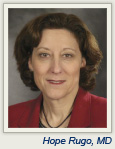 Hope Rugo, MD, of the University of California, San Francisco, commented on Dr. O’Shaughnessy’s presentation on molecular pathways in triple-negative breast cancer at the 2011 San Antonio Breast Cancer Symposium. “The really exciting thing is that we have moved from intrinsic subtyping of breast cancer. While this may be important to do in the early setting, when we are looking at metastatic disease we really need to go several steps beyond this and figure out the targets,” she told The ASCO Post.
Hope Rugo, MD, of the University of California, San Francisco, commented on Dr. O’Shaughnessy’s presentation on molecular pathways in triple-negative breast cancer at the 2011 San Antonio Breast Cancer Symposium. “The really exciting thing is that we have moved from intrinsic subtyping of breast cancer. While this may be important to do in the early setting, when we are looking at metastatic disease we really need to go several steps beyond this and figure out the targets,” she told The ASCO Post.
“Dr. O’Shaughnessy’s experience is anecdotal, but it is a window into where we might be able to go from here,” she continued. “Still, we don’t understand enough yet. We cannot make conclusions based on anecdotes or data from single patients. We must be cautious moving forward. We don’t want to do expensive testing on every patient and then have them travel across the country for an experimental trial. But as a research area, this is very exciting.” ■
Disclosure: Dr. Rugo has received research funding from Genentech, Novartis, Merck, and Pfizer.

